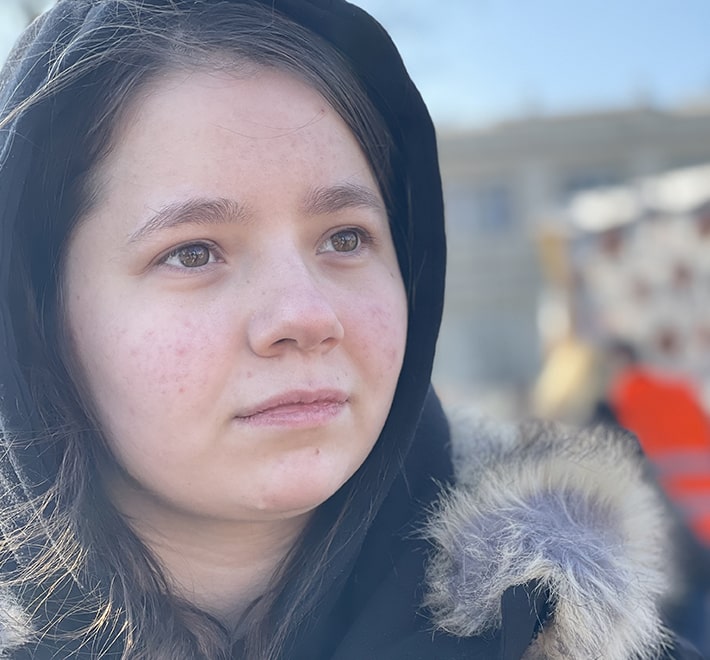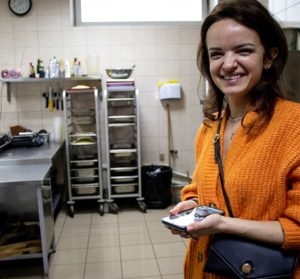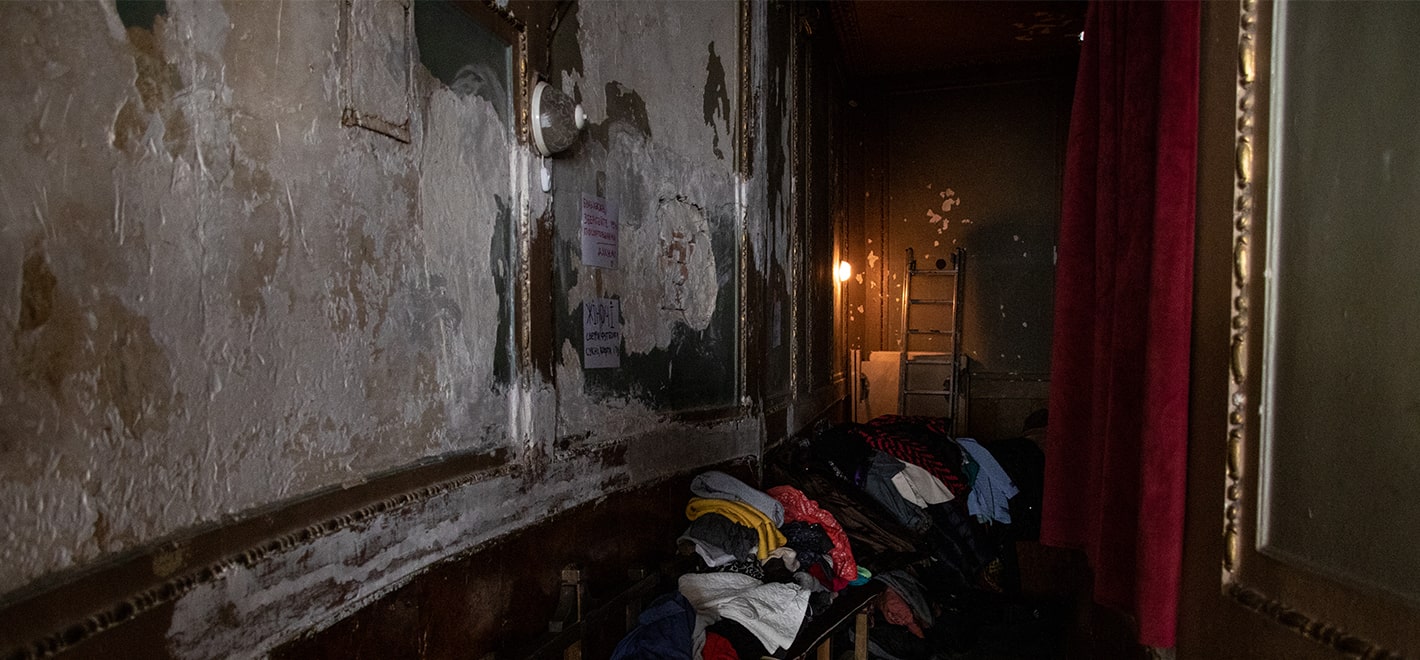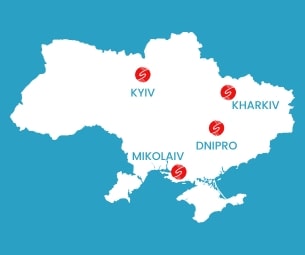In Ukraine, SOLIDARITÉS INTERNATIONAL is helping the affected populations in the conflict zones but also in the regions where many people have found refuge. This report illustrates the support provided by the organisation to Ukrainians who are confronted daily with hunger, cold, lack of drinking water and hygiene.
n Shehyni, on the border between Ukraine and Poland, Luda is waiting with her two daughters to leave the country, a trolley suitcase in her hand and two small bags on the girls’ shoulders. “We are from Polohi,” she says as she heads for the border post, “a small village next to Zaporizha”, a town 150km from Mariupol from where the evacuation trains leave. Next door, a minivan arrives and Sasha*, a 70-year-old woman, gets off with her dog in her arms. “I’ve spent my whole life in Marioupol,” she says, “for the younger people it must be easier, but for us… how can we rebuild a life at our age? We’re going to Poland without knowing what’s going to happen, or where to go…”
This is the story of one in four Ukrainians.
Since the beginning of the conflict, 5.3 million people have left Ukraine, and 7.7 million are currently internally displaced (source: OCHA). In the early days of the conflict, Philippe Bonnet, head of mission of SOLIDARITÉS INTERNATIONAL in Ukraine, crossed the border “in impressive conditions, with thousands of refugees and a 20 km queue to access the border”, he recalls. A month and a half later, the flow of people crossing the border has decreased significantly. “Those who wanted to leave have already left the country, the others are now internally displaced persons,” he says in front of the SOLIDARITÉS INTERNATIONAL stand distributing meals and hot drinks at the Lviv train station, 80 km from the Polish border.
Lviv is now internationally known for the number of people who have been transiting and/or taking refuge there since the end of February: it is estimated that more than 400,000 internally displaced people have been welcomed there. In the station, loudspeakers announce the evacuation trains. People get off silently. Three women with two children from Marioupol cannot speak. Their eyes are red and they are about to leave for the Polish border. A girl sitting next to them has a transparent face, a blank stare towards the ground, her shoulders slumped. She can barely drink her hot tea.
Ukraine
Context and action- 37 million inhabitants
- 77th out of 191 countries on the Human Development Index
- 501,843 people rescued since march 2022

“Many trains arrive in the night,” says Katia, a volunteer at the SOLIDARITÉS INTERNATIONAL stand at the station. She has been in charge of the volunteers for more than a month, “We are there 24/7 to distribute meals and hot drinks so that people can warm up”. At night, temperatures are still below zero. What follows is another departure, this time outside the country or to a reception centre, to stay for one night, two nights, a week and sometimes for an indefinite time.
“When the explosions started in our neighbourhood, the bridge was bombed and we didn’t live far. We decided to leave, because it was very scary,” says Nina, 70, from Kiev, who arrived with her son and daughter. With a few things, she took the first train. “We arrived in Lviv at night. My daughter found some volunteers and they quickly accompanied us to the State Administration and we moved here, to this place”.
The centre where Nina is staying is close to a military site that was bombed a few days earlier. The windows are covered with black plastic bags to prevent them from shattering from the impact. “At the moment, we are hosting about 80 people,” says Iryna, a volunteer administrator at the collective centre where SOLIDARITÉS INTERNATIONAL distributes meals. “Many of the people who are here don’t know where to go, so they are staying,” she explains.
Natalia, a former sales department manager, now retired, has been volunteering at the centre since the second day of the conflict. “If you look at Sasha,” she says, pointing to her stirring soup in a pot for 30 people, “she’s from Kiev and she’s an IDP, but she helps in the kitchen, and the other volunteers come from all sorts of professions – a cosmetologist, a lawyer, a teacher. The volunteers quickly mobilised to coordinate and help. The Walnut House Foundation, a partner of SOLIDARITÉS INTERNATIONAL, provides the reception centre with meals that are prepared in the Catholic University’s kitchens.
At the Catholic University, 2,500 meals are prepared every day and the classrooms have now become dormitories. Here, Cristina coordinates the team of cooks. “Before the war, I was the manager of the Walnut House catering service ; we did meal deliveries, weddings, parties, all these nice things. But now we’re volunteering and preparing meals for those in need,” she says.

The whole city mobilised to deal with such a large number of people whose main needs were food and shelter. On the other hand, the large influx of people has pushed up housing prices in the entire Lviv region. “This is the safest area in Ukraine at the moment,” says Maud Rivoal, SOLIDARITÉS INTERNATIONAL’s programme coordinator in Ukraine. “In Lviv, there was housing, and obviously there is not enough of it anymore because of the number of people moving around. “As a result, SOLIDARITÉS INTERNATIONAL is developing rehabilitation projects that are “more sustainable for the people”, says Maud, “These buildings need to be refurbished, especially in terms of heating, electricity, furnishings such as beds, and access to water, so that people have access to hygiene.

Two months into the war more and more people are staying closer to their homes, so that some of the transit towns are now being re-inhabited, such as Uman, which is a central axis linking north and south and east and west. “When we arrived in Uman, it was evening, the city was completely dead, in complete blackout, no lights were allowed in order to avoid the bombings,” says Philippe Bonnet. “When I went back four weeks later, life had resumed, people were in the streets and were beginning to adapt to this new situation, to the sirens for example, which announce potential air attacks. Now people are used to it, it’s part of the landscape, but at the time people were rushing to the shelters.
However, the wave of displacement is far from over. Especially following the resumption of fighting in several areas of Donbass.
“There are areas that are not accessible at all, where humanitarian aid does not arrive, such as Marioupol for example,” adds Philippe. For the time being, humanitarian convoys cannot yet enter the encircled towns. When there are negotiations, SOLIDARITÉS INTERNATIONAL will take part in the convoys,” but we have first chosen to work with local associations that regularly travel to these areas, and which, on the way out, in their small trucks, manage to bring a few hundred kilos of food each day, and which, on the way back, evacuate people from the combat zones,” explains Philippe.
Actions have been carried out in the Kharkiv metro, where hundreds of families now live to protect themselves from the bombings. SOLIDARITÉS INTERNATIONAL has distributed food kits, drinking water, hygiene kits and even games for children. SOLIDARITÉS INTERNATIONAL teams have also installed water filters in the metro to make the water drinkable.
In Kramatorsk and Pokrovsk, two towns in the Donbass that are in danger of being surrounded very quickly, SOLIDARITÉS INTERNATIONAL has stocked the air raid shelters with drinking water and food kits.
Many elderly people and people with reduced mobility who cannot leave their homes are at risk of running out of everything very quickly.
SOLIDARITÉS INTERNATIONAL is also working in Moldova, where 110,000 people have found refuge, 35% of whom remain in the country waiting to return to Ukraine if the situation changes. Operations in Moldova focus on supporting the various organisations present in the country through the distribution of food and basic necessities, as well as activities to provide access to water, sanitation, hygiene and shelter.
*first name changed

